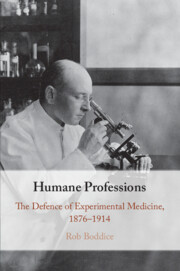Book contents
- Humane Professions
- Humane Professions
- Copyright page
- Dedication
- Contents
- Illustrations
- Acknowledgements
- Introduction: Experior
- 1 Darwin’s Compromise
- 2 Medical Monsters?
- 3 Of Laboratories and Legislatures
- 4 Paget’s Public
- 5 Cannon Fire
- Epilogue: Humanity and Human Experimentation
- Select Bibliography
- Index
2 - Medical Monsters?
Published online by Cambridge University Press: 22 January 2021
- Humane Professions
- Humane Professions
- Copyright page
- Dedication
- Contents
- Illustrations
- Acknowledgements
- Introduction: Experior
- 1 Darwin’s Compromise
- 2 Medical Monsters?
- 3 Of Laboratories and Legislatures
- 4 Paget’s Public
- 5 Cannon Fire
- Epilogue: Humanity and Human Experimentation
- Select Bibliography
- Index
Summary
German scientists were troubled by the activities of antivivisectionists, with ideas imported from England, and they still struck a defensive attitude. Yet in this period, the German scientific establishment did not immediately feel compelled to organize collectively, at least not to any great extent, to protect themselves. Their defence was as ad hoc as it was incoherent, perhaps reflective of the small extent to which they were troubled. More significantly, German scientists faced accusations outside of Germany of a brutality or callousness that was specific to the German national character. They were raised, by antivivisectionists and scientists alike, as being a dangerous influence on the morals and character of scientists in other countries. If there was callousness in experimental medicine, so one of the arguments went, it was not because the experiments themselves caused it; it was because Germanness was particularly vulnerable to moral numbness. Given that the rest of the civilized world was sending its brightest hopes for the medical future to Germany for training in experimental medicine, particularly to men such as Carl Ludwig and Rudolf Virchow, this perception of personal character flaws was the cause of fear.
- Type
- Chapter
- Information
- Humane ProfessionsThe Defence of Experimental Medicine, 1876–1914, pp. 50 - 79Publisher: Cambridge University PressPrint publication year: 2021



